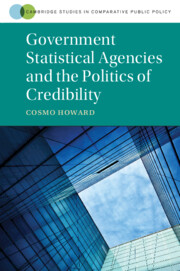Book contents
- Government Statistical Agencies and the Politics of Credibility
- Cambridge Studies in Comparative Public Policy
- Government Statistical Agencies and the Politics of Credibility
- Copyright page
- Dedication
- Contents
- Tables
- Acknowledgements and Declaration
- Acronyms and Abbreviations
- Introduction
- 1 Credibility and Official Statistics
- 2 Australia
- 3 Canada
- 4 Sweden
- 5 The United Kingdom
- 6 The United States of America
- 7 Conclusions
- Notes
- List of Cited Interviews by Order of Appearance
- References
- Index
4 - Sweden
Published online by Cambridge University Press: 05 March 2021
- Government Statistical Agencies and the Politics of Credibility
- Cambridge Studies in Comparative Public Policy
- Government Statistical Agencies and the Politics of Credibility
- Copyright page
- Dedication
- Contents
- Tables
- Acknowledgements and Declaration
- Acronyms and Abbreviations
- Introduction
- 1 Credibility and Official Statistics
- 2 Australia
- 3 Canada
- 4 Sweden
- 5 The United Kingdom
- 6 The United States of America
- 7 Conclusions
- Notes
- List of Cited Interviews by Order of Appearance
- References
- Index
Summary
In 1994, many responsibilities of Statistics Sweden were transferred to new statistical units operating within policy areas. Statistics Sweden has gradually accrued greater formal powers to oversee and coordinate official statistics in the country, leading to a partial reversal of the decentralisation reforms. Chapter 4 shows how credibility imperatives and institutional settings have shaped these developments. Decentralisation emerged following the end of social democratic political hegemony, when centrist and new-right governments demanded greater responsiveness and efficiency and sought to break up bureaucratic monoliths. Depoliticisation pressures, driven by the EU context, have resulted in a political push for recentralisation of authority. Statistics Sweden historically pursued credibility by emphasising competency, but shifted to stressing usefulness and demystification of official statistics. Sweden’s statisticians enjoy formal independence thanks to constitutional provisions that protect the autonomy of Swedish government agencies, but continuous informal dialogues are used to secure policymakers’ influence over statistical agendas.
Keywords
- Type
- Chapter
- Information
- Government Statistical Agencies and the Politics of Credibility , pp. 107 - 137Publisher: Cambridge University PressPrint publication year: 2021

